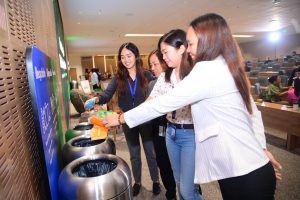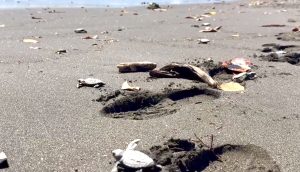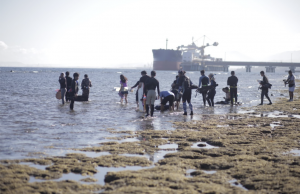 CAGAYAN DE ORO CITY— To help strengthen the quality and quantity of environmental news coverage in the Philippines, the U.S. Embassy in the Philippines has partnered with the Association of Young Environmental Journalists to organize an environmental journalism training for young writers across 5 key areas in the country
CAGAYAN DE ORO CITY— To help strengthen the quality and quantity of environmental news coverage in the Philippines, the U.S. Embassy in the Philippines has partnered with the Association of Young Environmental Journalists to organize an environmental journalism training for young writers across 5 key areas in the country
The Green Beat: Islas is a series of month-long virtual media training and capacity-building workshops on environmental journalism for 100 selected campus journalists across Palawan, Zambales, Occidental Mindoro, Bohol, and Cagayan de Oro City.
The ultimate vision of this project is to improve the news coverage on environmental issues in the campus and community newspapers, as well as different multimedia platforms, by equipping young journalists with the necessary skills, knowledge, and expertise to pursue the green beat in storytelling.
“There’s not enough information out there in the mainstream media on environmental and climate changes issues,” said U.S. Embassy’s Public Affairs Officer Philip Roskamp during the program launch, “Clearly, more needs to be done. More needs to be reported on. And now the responsibility lies with you to report on [issues such as] wildlife trafficking, maritime security, IUU fishing, and coastal conservation.”
Because of the need to increase media coverage and social conversations on different environmental issues in the country, organizers believe that a potential change agent in this effort are young environmental journalists, student writers, and media practitioners who are considered catalysts for social, cultural and environmental development.
An innovative online learning approach
With this niche, aspiring young environmental journalists will be engaging in an intensive one-month online training to hone their skills in using the art and science of journalism to share compelling community stories on the environment.
The training will employ a self-paced online learning approach where participants will engage with on-demand learning materials and a video conference session to synthesize learnings at the end of the week.
By the end of the training, participants will be tasked to cover local environmental stories and pitch these story outputs to different media outlets for publication.
Throughout the training, the selected campus journalists will be paired with mentors who will share their wisdom, industry experience, and technical expertise as journalists and environmental writers to develop their story.
The most outstanding participants from the online training will get a chance to convene in Manila in August 2021 for the advanced workshop and summit where they will be immersed in the topics of data visualization, investigative storytelling, community organizing, and environmental stewardship. The conference will culminate with a story pitching competition where participants will have a chance to win a story grant that will allow them to pursue in-depth reporting on a critical environmental issue in their locality.
This training will focus on thematic areas of environmental sustainability, maritime security, and coastal conservation. Roskamp said that these stories will hopefully result in a more informed public who will make better personal decisions and influence better policy.
“As you know you’re an archipelagic nation of more than 7,000 islands. Literally, your fish is your future. You depend on marine resources not only for food security but also for incomes. So this project, we hope, teaches people how to tell the story of marine resource use,” said Roskamp, noting both the good and bad stories of resource exploitation and scalable developmental initiatives.
‘The Green Beat’
This program is an innovative initiative that aims to capacitate student journalists from 5 different island-cities across the Philippines to become young environmental storytellers in the hope of addressing the lack of environmental story coverage, hence—The Green Beat: Islas.
In journalism, the word “beat” refers to a specific subject matter that journalists are assigned to cover. It is also the in-depth reporting of a particular topic or field.
Meanwhile, “green” is associated with the environment and nature. Together, “Green Beat” is a term journalists use to refer to an environmental report or news and feature story.
“It’s about time that we mainstream positive environmental stories as a significant beat to cover for young journalists,” said Val Amiel Vestil, Executive Director of AYEJ.org.
AYEJ is a start-up media and environmental non-profit based in Cagayan de Oro City committed to enabling communities to be ecologically literate and proactive towards a more livable planet which has trained over 200 young writers across the Philippines.
The program is open to all enrolled college students from the 5 areas who have a minimum background in journalism or writing and a strong interest in environmental advocacy.
Interested applicants may visit www.ayej.org/islas to apply or email greenbeat@ayej.org for inquiries and concerns. The first batch of training will happen in March 2021.




